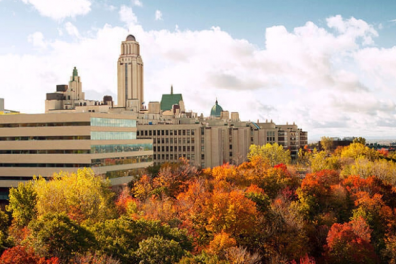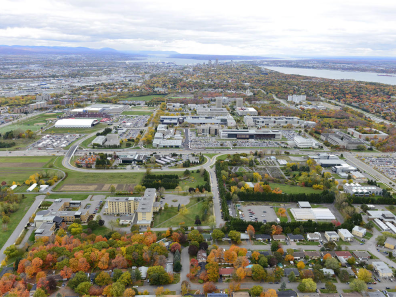Back from Quebec: new prospects for cooperation
There is, of course, the problem of language. This is one of the reasons why Inalco has decided to start by developing its cooperation with Quebec universities, most of which are French-speaking.
Anne Grynberg, vice-president in charge of international relations, went on a mission to Montreal and Quebec City in autumn 2018, with the aim of "listing" possible partnerships and laying the foundations for their implementation.

Created in 1878 under the aegis of the diocese, the Université de Montréal (UdeM) was restructured and reoriented, in a secularized academic form, from 1965 onwards. This year, it brings together 66,506 students in all cycles, including 9,341 international students. It is considered the leading centre of higher education in Quebec, the third-largest university in Canada, and ranks 90th in the Times Higher Education rankings. It has agreements with universities in over fifty countries. Its location on the slopes of Mont Royal, amidst vast wooded areas, is an added bonus. Isn't it called "the mountain campus"?
Perfectly organized by Mrs Stéphanie Tailliez, director of the international relations department, the three days of meetings with colleagues from UdeM's Faculty of Arts and Sciences were both enjoyable and fruitful.
To cite just a few examples:
- Mrs Sylvie Dubuc, director of the School of Languages where Arabic, Chinese, Korean, Greek, Innu, Japanese and Russian are taught, was very supportive of exchanges of teacher-researchers and students, as well as the joint organization of study days and colloquia.
- Colleagues from the anthropology and political science departments were also interested in launching joint activities, as were those involved in multidisciplinary programs such as "International Analysis and Strategy", "Digital Publishing", Jewish Studies", "Museology", "Pluralism Practices and Policies"
- Mrs Diana Dimitrova, a specialist in Hinduism and South Asian religions, explained that, while Hindi is a widely spoken language in Montreal, there is no academic teaching of the language. She deplores this deeply, as do her colleagues at Montreal's other main universities: Université du Québec à Montréal (UQAM), McGill University and Concordia. It seems that they would all be willing to launch a joint program drawing on Inalco's expertise to set up distance learning of Hindi, as well as conference programs and, if possible in the medium term, a summer university.
- Mrs Valérie Amiraux, UdeM's vice-dean for international relations, herself a sociologist of religion, also expressed her support for all forms of cooperation with Inalco.
We also met with the heads and colleagues of several research centers:
- the CERIUM (Centre d'études et de recherches internationales), which brings together several teams. It is ready to welcome doctoral and post-doctoral students from Inalco under excellent scientific and financial conditions. A specialist in comparative politics herself - in particular, identity politics, ethnic conflict, inter-ethnic reconciliation and integration in Central Europe and the post-Soviet space - CERIUM's director, Mrs Magdalena Dembinska, also informed us of the organization, for the past fifteen years, of summer schools held annually for a week at UdeM, at the suggestion[1] of Canadian and/or foreign colleagues.
Please note: the PRIAS (Pôle de recherche sur l'Inde et l'Asie du Sud) is now attached to CERIUM. It is directed by anthropologist Karine Bates and brings together mainly sociologists, historians, historians of religion and economists. Its main lines of research focus on cultural diversity in South Asia in the face of contemporary challenges.
- the CÉTASE (Centre d'études asiatiques), whose members are specialists in East and Southeast Asia, in various disciplinary fields.
Since 2002, the Research Chair in Asian Studies, whose holder is geographer Rodolphe de Koninck, has been attached to CÉTASE
Since 2016, CÉTASE has been associated with the Research Chair in Sustainable Urbanization in the Global South, whose holder is Danielle Labbé and whose work focuses mainly on the challenges of urban transition in Southeast Asia, particularly in Vietnam.
We also met with Professor Laurence Monnais-Rousselot, director of the Centre d'études sur l'Asie de l'Est, vice-president of HOMSEA (History of Medicine in Southeast Asia). Despite very tight deadlines, she agreed to come to Paris to take part in the 9th annual conference of CAAS (Consortium for Asian and African Studies), which this year was organized by and at our establishment.
________________________________________________________

We then headed to Québec to meet colleagues at université Laval. Founded in 1852 on the initiative of the Séminaire de Québec, it is the oldest French-language institution of higher learning in America and one of Canada's top ten research universities. This year, it has 43,000 students, including 6,600 international students.
We had lengthy discussions with Pr. Guillaume Pinson, Dean of the Faculty of Letters and Humanities, who is extremely supportive of all forms of cooperation with Inalco. A position resolutely shared by Mrs Rachel Sauvé, director of the School of Languages (where Arabic, Japanese, Mandarin and Russian are taught); by Mrs Johanna-Pascale Roy, director of the Linguistics Department and Mrs Véronique Nguyen-Duy, director of the Information and Communication Department.
Mrs Tatiana Mogilevskaya and Pr. Alexandre Sadetsky, respectively teacher of Russian, director of the Centre Moscou-Québec and director of the Russian Studies program at Université Laval, share this real enthusiasm. In addition to Russian language courses, they are developing teaching programs around history, religious history and also on theater, cinema and music. They also organize intensive summer courses, in collaboration with Moscow State University.
The Pr. Michel Fortin, director of the Department of Historical Sciences, head of the Laboratory of Near Eastern Archaeology, has given us an extremely warm welcome. He plans to come to Paris in spring 2019 and would like to visit Inalco and Bulac. Visit already made in December 2018, shortly after our visit to Quebec City, by Mr. Shenwen Li, a teacher in the Chinese studies department, specializing in relations between China and the West in the 17th and 18th centuries.
We also spoke with Pr. Habib Saïdi, director of IPAC (Institut du Patrimoine culturel), who is pursuing innovative research on the interaction between heritage and tourism, particularly in the context of identity claims. A joint study day(s) project is under consideration.
We were also received at the CIERA (Centre interuniversitaire d'études et de recherches autochtones). We spoke in particular with Mrs Caroline Hervé -docteure at Inalco- holder of the chair on relations with Inuit societies. She expressed her deep regret that no Inuit language courses are offered at Laval University. At present, two doctoral students in anthropology at Laval University are taking courses at INALCO, thanks to the system of Inuktitut courses by videoconference in place since 2013. (This system is itself based on INALCO's collaboration with the McGill RUIS Telehealth Office.) Caroline Hervé, Michelle Daveluy - Director of the Anthropology Department -, and Marc-Antoine Mahieu - Associate Professor in the Anthropology Department - are currently working to strengthen cooperation between our institutions, with a view to opening an Inuit language and culture course at Université Laval starting next year.
In addition, an existing collaboration on Tibetan studies will be strengthened.
So many stimulating contacts and rich prospects for joint work. A draft framework agreement between Inalco and UdeM's Faculty of Arts and Sciences, validated by the International Relations Committee and then ratified by Inalco's Board of Directors, is currently in the process of being signed; the same applies to Laval University's Faculty of Arts and Humanities.
___________________
[1] Between twelve and fifteen summer schools are held each year. Proposals (themes and prospective participants) should be sent in by the end of October (View e-mail).